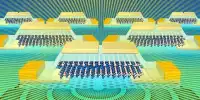Quantum computers have already surpassed ordinary computers in solving certain tasks – albeit completely useless ones. The next goal is to get them to do something useful. Researchers at the Chalmers University of Technology in Sweden have demonstrated that their small but functional quantum computer can solve a small part of a real-world logistics problem.
In recent years, there has been a surge in interest in building quantum computers, with feverish work underway in many parts of the world. In 2019, Google’s research team made a significant breakthrough when their quantum computer solved a task far faster than the world’s best supercomputer. The downside is that the solved task had no practical application; it was chosen because it was judged to be easy to solve for a quantum computer while being extremely difficult for a conventional computer.
As a result, one important task now is to identify users, relevant problems that are beyond the capabilities of ordinary computers but that a relatively small quantum computer could solve.
“We want to be certain that the quantum computer we are developing will be able to assist in the early resolution of relevant problems. As a result, we collaborate closely with industrial firms “says theoretical physicist Giulia Ferrini, one of the project’s leaders at the Chalmers University of Technology, which began in 2018.
Quantum computers have already managed to surpass ordinary computers in solving certain tasks – unfortunately, totally useless ones. The next milestone is to get them to do useful things. Researchers have now shown that they can solve a small part of a real logistics problem with their small, but well-functioning quantum computer.
Giulia Ferrini led the theoretical work with Göran Johansson when a team of Chalmers researchers, including an industrial doctoral student from the aviation logistics company Jeppesen, recently demonstrated that a quantum computer can solve an instance of a real problem in the aviation industry.
The algorithm has been tested on two qubits. All airlines are experiencing scheduling issues. Assigning individual aircraft to different routes, for example, is an optimization problem that grows in size and complexity as the number of routes and aircraft increases.
Researchers hope that quantum computers will eventually be better than today’s computers at dealing with such problems. The basic building block of a quantum computer, the qubit, is based on completely different principles than the building blocks of today’s computers, allowing them to handle massive amounts of data with a small number of qubits.
However, because of their unique structure and function, quantum computers must be programmed differently than traditional computers. The Quantum Approximate Optimization Algorithm is one proposed algorithm that is thought to be useful on early quantum computers (QAOA).

The Chalmers research team has now successfully executed said algorithm on their quantum computer (a processor with two qubits) and demonstrated that it can solve the problem of allocating aircraft routes. Because the scale was so small in this first demonstration (only two planes), the outcome was easily verifiable.
Capability to handle a large number of aircraft The researchers were the first to demonstrate that the QAOA algorithm can solve the problem of assigning aircraft to routes in practice. They also managed to push the algorithm one level further than anyone else, which requires very good hardware and precise control.
“We demonstrated that we can map relevant problems onto our quantum processor. We still have a small number of qubits, but they function properly. Our strategy has been to first ensure that everything works flawlessly on a small scale before scaling up “says Jonas Bylander, a senior researcher at Chalmers who is in charge of the experimental design and is one of the project’s leaders.
The researchers’ theorists also simulated solving the same optimization problem for up to 278 aircraft, which would necessitate a quantum computer with 25 qubits. “As we scaled up, the results remained good. This implies that the QAOA algorithm has the potential to solve similar problems at larger scales “Giulia Ferrini says.
Surpassing today’s best computers, on the other hand, would necessitate much larger devices. Chalmers researchers have started scaling up and are currently working with five quantum bits. The goal is to reach at least 20 qubits while maintaining high quality by 2021.
















